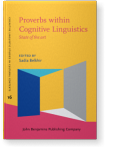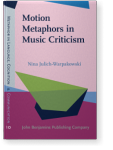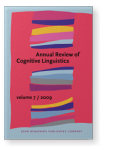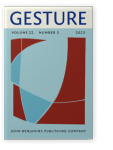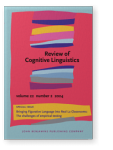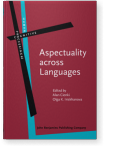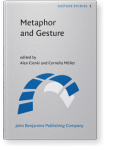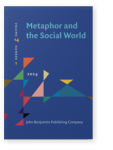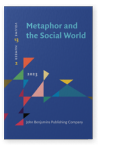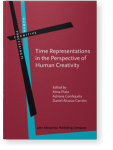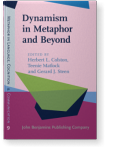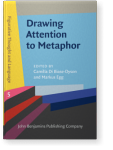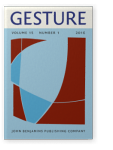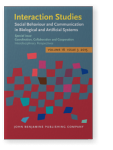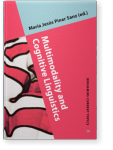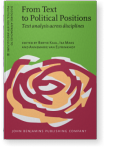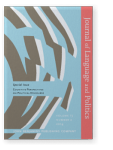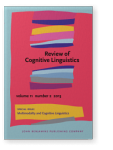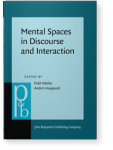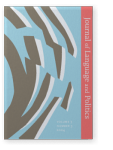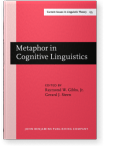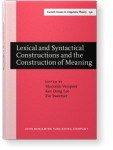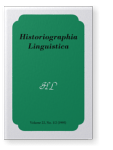Alan Cienki
List of John Benjamins publications for which Alan Cienki plays a role.
Book series
Yearbook
ISSN 1572-0268 | E-ISSN 1572-0276
Journals
ISSN 1877-9751 | E-ISSN 1877-976X
Titles
Aspectuality across Languages: Event construal in speech and gesture
Edited by Alan Cienki and Olga K. Iriskhanova
[Human Cognitive Processing, 62] 2018. xviii, 221 pp.
Subjects Cognition and language | Gesture Studies | Semantics | Syntax | Theoretical linguistics
Metaphor and Gesture
Edited by Alan Cienki and Cornelia Müller
[Gesture Studies, 3] 2008. ix, 306 pp.
Subjects Cognition and language | Gesture Studies
2024 The diachronic and cross-linguistic use of trade metaphors in U.S.-China governmental discourse: A socio-cognitive approach Metaphor and the Social World 14:1, pp. 130–153 | Article
This article compares diachronic and cross-linguistic uses of source domains for framing the target domain of trade in governmental discourses under the presidencies of Bill Clinton, Jiang Zemin, Donald Trump, and Xi Jinping. Taking a socio-cognitive approach, we examine trade metaphor use… read more
2023 Metaphors as tools for understanding in science communication among experts and to the public Metaphor and the Social World 13:2, pp. 248–268 | Article
Science communication is highly important in present-day society. But mere factual information transfer does not suffice for enhancing public understanding of scientific results, theories, and concepts. In this paper we compare science communication among experts with communication from experts… read more
2022 Epilogue. Creative to whom, and on what basis? The role of perspective Time Representations in the Perspective of Human Creativity, Piata, Anna, Adriana Gordejuela and Daniel Alcaraz Carrión (eds.), pp. 233–242 | Chapter
This epilogue considers creativity from three different perspectives: that of the producer of the expression, of the person paying attention to the expression (the attender) in the same context, and of any attender from a different time and place than that in which the expression was produced.… read more
2022 Researching embodied metaphor production through improvisational dance practice Dynamism in Metaphor and Beyond, Colston, Herbert L., Teenie Matlock and Gerard J. Steen (eds.), pp. 63–76 | Chapter
This contribution considers how artistic research based on the development of a form of practice for improvisational dance draws upon, and helps develop, theory from cognitive linguistics and principles from the phenomenology of movement. Dancers given the task of translating the sound of a… read more
2020 A multimodal perspective on MCA: Cues of (possible) metacommunicative awareness Drawing Attention to Metaphor: Case studies across time periods, cultures and modalities, Di Biase-Dyson, Camilla and Markus Egg (eds.), pp. 63–92 | Chapter
Metacommunicative awareness (MCA) is proposed as a scalar phenomenon of being aware, to different possible degrees, that the form and/or content of how you are acting could communicate something to someone else. Observable signals of possible MCA that are based on greater use of effort are… read more
2016 Mapping out the multifunctionality of speakers’ gestures Gesture 15:1, pp. 37–59 | Article
Although it is widely acknowledged that gestures are complex functional elements of human communication, many current functional classification systems are rather rigid, implicitly assuming gestures to perform only one function at any given time. In this paper, we present a theoretical view on… read more
2015 Insights into coordination, collaboration, and cooperation from the behavioral and cognitive sciences: A commentary Coordination, Collaboration and Cooperation: Interdisciplinary perspectives, Amici, Federica and Lucas M. Bietti (eds.), pp. 553–560 | Article
The study of coordination, collaboration, and cooperation brings to the fore a number of questions concerning the cognitive status of the various forms of behaviors that are involved. In this article, we will briefly consider coordination, collaboration, and cooperation in terms of their respective… read more
2015 Image schemas and mimetic schemas in cognitive linguistics and gesture studies Multimodality and Cognitive Linguistics, Pinar Sanz, María Jesús (ed.), pp. 195–209 | Article
Image schemas have been a fundamental construct in cognitive linguistics, providing grounds for psychological, philosophical, as well as linguistic research. Given the focus in cognitive linguistics on embodied experience as a fundamental basis for language structure and meaning, the employment of… read more
2014 PART III: Introduction From Text to Political Positions: Text analysis across disciplines, Kaal, Bertie, Isa Maks and Annemarie van Elfrinkhof (eds.), pp. 271–274 | Article
2014 Conversational framing in televised political discourse: A comparison from the 2008 elections in the United States and Italy Cognitive Perspectives on Political Discourse, Fischer, Pascal and Christoph Schubert (eds.), pp. 255–288 | Article
The present study applies the notion of framing by examining how politicians may frame themselves as conversation partners with the audience, even in the virtual environment of television (and Internet video). The hypothesis is that ‘populist’ politicians are more likely than other kinds to frame… read more
2013 Image schemas and mimetic schemas in cognitive linguistics and gesture studies Multimodality and Cognitive Linguistics, Pinar Sanz, María Jesús (ed.), pp. 417–432 | Article
Image schemas have been a fundamental construct in cognitive linguistics, providing grounds for psychological, philosophical, as well as linguistic research. Given the focus in cognitive linguistics on embodied experience as a fundamental basis for language structure and meaning, the employment of… read more
2008 Looking at analyses of mental spaces and blending / Looking at and experiencing discourse in interaction Mental Spaces in Discourse and Interaction, Oakley, Todd and Anders Hougaard (eds.), pp. 235–245 | Article
2008 Why study metaphor and gesture? Metaphor and Gesture, Cienki, Alan and Cornelia Müller (eds.), pp. 5–25 | Article
There are numerous ways to research gestures which represent abstract notions, and this paper begins with an overview of some of them which are represented in the current volume – from various semiotic approaches to experimental psychological studies. Then particular attention is given to… read more
2008 Introduction Metaphor and Gesture, Cienki, Alan and Cornelia Müller (eds.), pp. 1–4 | Miscellaneous
2005 The metaphorical use of family terms versus other nouns in political debates Identifying information and tenor in texts, Lagerwerf, Luuk, Wilbert Spooren and Liesbeth Degand (eds.), pp. 27–39 | Article
2004 Bush’s and Gore’s language and gestures in the 2000 US presidential debates: A test case for two models of metaphors Communicating/Doing Politics, pp. 409–440 | Article
Lakoff (1996) analyzes American political positions in terms of two different sets of conceptual metaphors: the right wing ‘Strict Father’ (SF) model and the left wing ‘Nurturant Parent’ (NP) model. The current study is an empirical test of the degree to which these models were manifested in the… read more
1999 Metaphors and cultural models as profiles and bases Metaphor in Cognitive Linguistics: Selected papers from the 5th International Cognitive Linguistics Conference, Amsterdam, 1997, Gibbs, Jr., Raymond W. and Gerard J. Steen (eds.), pp. 189–204 | Article
1999 Some Properties and Groupings of Image Schemas Lexical and Syntactical Constructions and the Construction of Meaning: Proceedings of the bi-annual ICLA meeting in Albuquerque, July 1995, Verspoor, Marjolijn H., Kee Dong Lee and Eve Sweetser (eds.), pp. 3–16 | Article
1995 19th and 20th century theories of case: A comparison of localist and cognitive approaches Historiographia Linguistica 22:1/2, pp. 123–162 | Article
This article considers the similarities and differences between two types of semantically-based approaches to the study of grammatical case. One approach, which views the basic meanings of cases as spatial, stems from the localist hypothesis, which claims that spatial expressions serve as… read more
East Asian languages and cultures are known to show substantial differences from European ones, including in terms of how negation is expressed. The present study considers how gestures relate to the expression of verbal negation by speakers of Mandarin Chinese. Based on around 400 minutes of… read more
